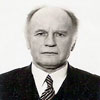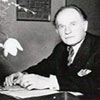Aleksander Weiler
 Aleksander Weiler played an instrumental role in the War of Independence (1918 - 1920) and the subsequent creation of the Estonian Republic. Between the two world wars Weiler created Estonia's largest newspaper syndicate. During the Second World War, he and his family alluded Communists by escaping to Sweden. He had no choice but to terminate his successful newspaper publication. He re-established his career in journalism in Sweden and continued his passion newspapers when he immigrated to Canada by founding the Estonian weekly Meie Elu in Toronto in 1950. His untimely death at the age of sixty-three put an end to the resumed career as well as to the many services he rendered to the Estonian displaced persons community in Canada.
Aleksander Weiler played an instrumental role in the War of Independence (1918 - 1920) and the subsequent creation of the Estonian Republic. Between the two world wars Weiler created Estonia's largest newspaper syndicate. During the Second World War, he and his family alluded Communists by escaping to Sweden. He had no choice but to terminate his successful newspaper publication. He re-established his career in journalism in Sweden and continued his passion newspapers when he immigrated to Canada by founding the Estonian weekly Meie Elu in Toronto in 1950. His untimely death at the age of sixty-three put an end to the resumed career as well as to the many services he rendered to the Estonian displaced persons community in Canada.
Weiler was born in 1887, the son of a gardener on an estate in Estonia. Leaving school at 15, he worked as a machinist and electrician. His career in journalism began at the age of twenty when he became the editor of a periodical. He was one of the founders of a daily in Tallinn whose editor happened to be Konstantin Päts, the first president of the Republic of Estonia. From 1914 to 1917, Weiler worked as the news editor and war correspondent.
 Weiler was active in the underground Estonian provisional government formed by the end of the First World War. In November of 1918 he began recruiting volunteers united against Russia. As one of the founders of the left of centre Labour Party, which was a leading political force in the early days of the Estonian Republic, he helped to found the publishing company Waba Maa (Free Country) and the newspaper of the same name which served as the party's voice. Later, he was a member of State Assembly (or parliament) until 1929, when he withdrew from active party politics. During the 1920s and 30s , he developed Waba Maa newspaper and its associated publications into Estonia's biggest newspaper publication.
Weiler was active in the underground Estonian provisional government formed by the end of the First World War. In November of 1918 he began recruiting volunteers united against Russia. As one of the founders of the left of centre Labour Party, which was a leading political force in the early days of the Estonian Republic, he helped to found the publishing company Waba Maa (Free Country) and the newspaper of the same name which served as the party's voice. Later, he was a member of State Assembly (or parliament) until 1929, when he withdrew from active party politics. During the 1920s and 30s , he developed Waba Maa newspaper and its associated publications into Estonia's biggest newspaper publication.
During the German occupation of Estonia from 1941 to 1944, only papers approved by the Germans were allowed to be published and Waba Maa was not one of them. In September, 1944, as the Soviets were entering Estonia, he and some of his family escaped by boat across the Gulf of Finland. Weiler continued his journalism trade at a newspaper in Sweden. Through an invitation from his daughter, Aleksander and his wife Stella came to Canada in 1948. His daughter Lea had married Walter Silverton of Barons, Alberta and, together, they had immigrated to Canada before the Second World War.
A tremendous organizer, Weiler began coordinating the unification of numerous Estonian clubs and organizations already in existence in southern Alberta. After moving to Toronto, he co-founded the Estonian Federation of Canada (Eesti Liit Kanadas) in 1949. As the organization's first president, he coordinated the immigration of post-war Estonian refugees to Canada by working closely with the Canadian government.
He continued his passion for newspaper publishing by co-creating the Estonian Publishing Company of Canada (Eesti Kirjastus Kanadas) and became the publisher of the weekly Meie Elu (Our Life) in the spring of 1950.
Aleksander was followed to Barons in May, 1948, by his son, Rein, his wife Marga and their three children: Roland, Hendrik and Merike. Aleksander's daughter, Asta, also immigrated to Canada with Aleksander's assistance. Asta was accompanied by her husband and their three children: Indrek, Reet and Helga. The older children attended school in Barons. Asta and her family later moved to British Columbia. After Aleksander's death, his son and family moved to Toronto to continue the work at Meie Elu.








